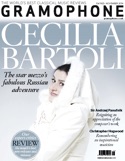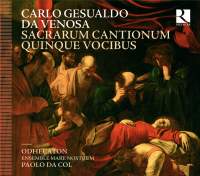Texte paru dans: / Appeared in:
*

GRAMOPHONE (11/2014)
Pour s'abonner /
Subscription information
Ricercar
RIC343

Code-barres / Barcode : 5400439003439 (ID444)
Consultez toutes les évaluations recensées pour ce cd
~~~~ Reach all the evaluations located for this CD
Reviewer:
Fabrice Fitch
Those expecting the composer’s trademark chromaticisms in his motets will be largely disappointed, but these more conservative pieces dispel the idea that Gesualdo’s eccentricity was any mask for technical deficiency. This new recording of his first book of motets offers a very different perspective from the all-vocal version from Oxford Camerata and the more recent account of the second book from the Vocal Consort Berlin (Harmonia Mundi, 4/13). It corresponds more closely to the sort of performance conditions he might have expected: one or two voices to a part, a variety of instruments in different combinations either alongside or in place of voices, and assorted continuo instruments (though no organ). Some pieces are taken by a single top voice accompanied by instruments. This variety serves the programme well; but an especially welcome addition is the selection of organ pieces by Trabaci and the wonderful Giovanni de Macque, a musician whose influence appears increasingly out of proportion to his present obscurity: Lieuwe Tamminga’s presence adds much to the attraction of this project.
The motets were recorded in Venosa itself, and its subdued acoustic imparts an intimate gloom that is charmingly appropriate. Yet greater bloom might have given the singers more to work with, for they seem almost inhibited (particularly the countertenors, whose rather strained tone tends to iron out the differences between vowels). That tentativeness, surprisingly, comes across at key moments when those chromaticisms are at last unleashed (as at ‘Miserere mei’ in Peccantem me quotidie). Were the musicians distracted by the Prince of Venosa’s troubled spirit flitting about the place? I wonder.
Cliquez l'un ou l'autre
bouton pour découvrir bien d'autres critiques de CD
Click either button for many other reviews


